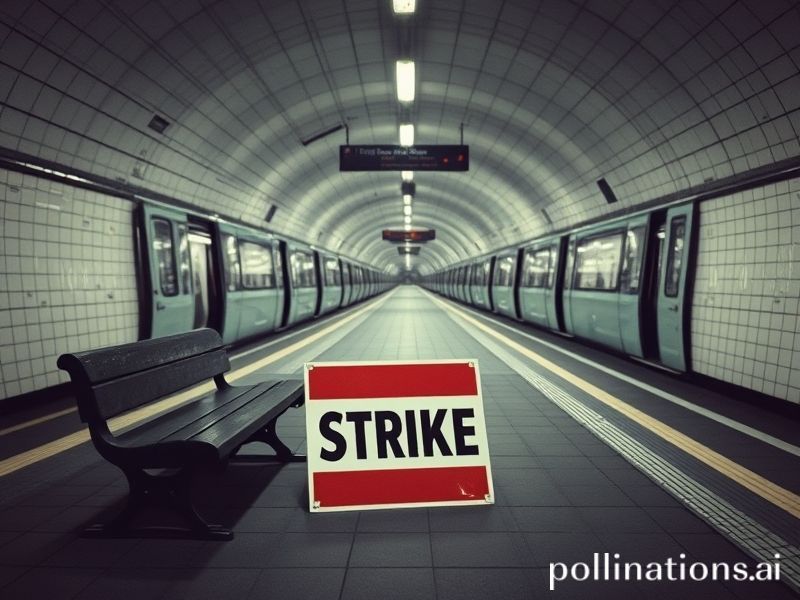Mind the Global Gap: How One London Tube Strike Sends Shockwaves from Tokyo to São Paulo
When the London Underground coughs itself into another 48-hour industrial coma, the world does not exactly stop turning. Traders in Tokyo still open their screens, Lagos bus drivers still outrun physics, and São Paulo’s skyline keeps blinking like a gambler who knows the house always wins. Yet beneath the blasé shrug of globalization, the tube strike—predictable as British rain, inconvenient as a conscience—manages to send out tiny ripples that lap, eventually, against every shore.
For the uninitiated, this particular strike is a lovers’ quarrel between Transport for London and the RMT union over pensions, job cuts, and the perennial question of who gets to control the robots once the robots finally learn to drive a train without that embarrassing lurch before Moorgate. On paper it’s local; in practice it’s a parable about 2024’s favorite pastime: pretending the future won’t need fewer of us.
Consider the global supply chain, that mythical beast we blame for empty shelves and full anxiety. London is an entrepôt where bankers sell derivatives by day and artisanal gin by night. When 3.5 million daily journeys evaporate, the espresso machine in the Goldman lobby still hisses, but the barista who restocks oat milk is stuck on a replacement bus that smells of wet carpet and class resentment. Somewhere in the Port of Singapore, a container of oat milk idles an extra eight minutes because the London buyer’s email was late—proof that even a city famed for polite queueing can still export chaos with imperial efficiency.
Meanwhile, on the other side of the planet, Seoul’s subway riders watch the strike on their phones between levels of Candy Crush and feel a twinge of envy. South Korean unions have perfected the art of the one-day protest—long enough to trend, short enough to avoid actual structural change. The British, ever nostalgic for the 1970s, still prefer their strikes like their weather: prolonged, grey, and accompanied by small talk about how “it’s not the rain, it’s the humidity.”
Zoom out further and the strike becomes a geopolitical mood ring. The dollar ticks up a fraction against sterling because foreign exchange algorithms interpret gridlock as uncertainty, and uncertainty is mother’s milk to the greenback. In Brussels, eurocrats add another paragraph to their annual report on “labor market rigidities,” blissfully unaware that their own chauffeured Audis are idling outside Berlaymont with engines running, a rolling metaphor for continental bureaucracy.
Of course, no modern disruption is complete without the gig-economy cavalry—Uber surge pricing that looks like the GDP of a small island nation, Deliveroo cyclists weaving through traffic like urban jousters, and Lime scooters strewn across pavements as if someone sneezed out a hardware store. It’s capitalism’s version of a humanitarian corridor: same destination, three times the price, and a Terms of Service longer than Dostoyevsky.
The human element is where the cynic’s heart warms a degree or two. Commuters rediscover the tops of their shoes, the novelty of daylight above ground, and the delicate art of pretending not to recognize their own neighbors while sharing the back of a double-decker. Citywide, carbon emissions drop just enough for the mayor to tweet a green-washed victory lap—then rise again once the strike ends and everyone celebrates by ordering imported avocados overnighted from Peru.
And then, like a hungover guest who finally leaves, the strike ends. Trains resume their subterranean parade, unions claim moral victory, management claims fiscal prudence, and commuters claim a renewed appreciation for headphones that cancel more than just noise. The world exhales, updates its risk models, and scrolls on—until the next scheduled round of brinkmanship arrives, right on time, like interest on student debt.
In the end, the tube strike is less about tunnels and tracks than about a planet still negotiating the price of progress one cancelled service at a time. It’s a reminder that no matter how fast the fiber-optic cables hum, the last mile always belongs to a human being—who may, inconveniently, want to retire before dying at the console.







